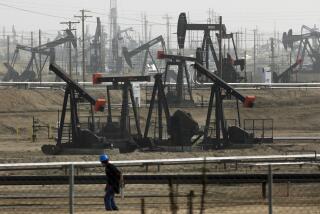British Petroleum Expects Oil Prices to Be Low for Years
British Petroleum, the oil and animal-feed giant partly owned by the British government, delivered a seemingly contradictory message in Los Angeles last week: Buy our stock but don’t expect much improvement in crude oil prices.
BP, whose historically close connections with Middle East oil-producing nations give it a good vantage point for puzzling out the recent agreement by members of the Organization of Petroleum Exporting Countries to cut oil production, does not expect much increase in oil prices for years to come.
“We will remain among the bears,” said Rodney Chase, group treasurer for BP, who met here with financial analysts.
The agreement reached Aug. 5 by OPEC members to hold down production for a two-month trial period is “the first serious break” and is “a serious initiative” to reverse the oil price slide that has ravaged many oil producers, Chase said. But he said that BP views the pact as fragile because of the widely differing economic and political priorities of OPEC’s members.
Even if it holds, Chase added, the current glut of oil will take many months to work off. He said the accord might leave crude oil prices in the $13- to $15-per-barrel range the rest of the year instead of the $10 to $12 range that prevailed before the agreement.
For planning purposes, he said, BP is assuming that world crude oil prices will average just $15 a barrel until the early 1990s. As recently as last November, crude oil fetched about $31 a barrel. But the sober outlook for oil prices has not prevented BP from sending Chase and other key executives on tours of this country in an effort to boost the puny--about 2%--proportion of the company’s shares owned by American investors. Upwards of 40% of BP’s assets are now based in the United States.
To most Americans, BP is perhaps the least known of the large, foreign-based companies with major U.S. holdings. One of the principals in the big Alaska oil strike of 1968, BP owns 55% of Standard Oil (formerly Standard of Ohio) and recently made its presence known there by firing the company’s top American managers.
This summer, while such oil companies as Atlantic Richfield were getting rid of non-energy holdings, BP agreed to pay $500 million for Ralston Purina’s big U.S. livestock-food operation, Purina Mills. The company has a similar business in Europe and also owns slaughter houses. The Purina acquisition will make BP the United States’ largest producer of food for livestock and poultry.
Chase said long-planned expansion into “this most unlikely area of animal feed” does not portend other major diversification moves. If anything, he said, a strategic reassessment now under way at the company is likely to result in greater emphasis on BP’s “core businesses,” meaning oil and gas.
In any event, BP had to do something with all the money it has lying around. Chase said of BP’s cash on hand, “When I left London, it was $4.5 billion.”
The company is looking to buy oil reserves at fire sale prices, he said. But, “if you’re a bear on oil prices and all the others are bulls, it’s hard to agree on a deal.”
As to whether Americans should be investing in BP, analysts have generally favorable views of the company, the oil price collapse notwithstanding. It has been pruning itself since 1981, when BP’s oil unit managed to lose money on an operating basis despite the highest world oil prices in history.
The world’s fourth-biggest oil company, behind Exxon, Royal Dutch Shell and Mobil, BP has what is considered a safe dividend because of its strong cash flow. The stock price on the New York Stock Exchange has actually climbed slightly since oil prices began to tumble last winter.
“It seems to be one of the stronger oil companies internationally,” said Los Angeles analyst Sarah Stack of Bateman Eichler, Hill Richards.
More to Read
Inside the business of entertainment
The Wide Shot brings you news, analysis and insights on everything from streaming wars to production — and what it all means for the future.
You may occasionally receive promotional content from the Los Angeles Times.










